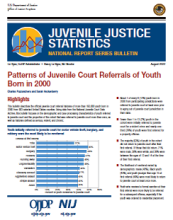Violent crime
Just Science Podcast: Just Key Considerations for Investigations of Sexual Assault Cases
Just Science Podcast: Just Addressing Child Sexual Violence
Just Science Podcast: Just the Intersection of At-Home Kits and Healing
Workforce Calculator Project
Just Science Podcast: Just Research on Anonymous and Unreported Sexual Assault Cases
FY22 OJP Community Based Violence Intervention & Prevention Initiative (CVIPI) & NIJ Evaluation of CVIPI Projects
Patterns of Juvenile Court Referrals of Youth Born in 2000
Just Science Podcast: Just Trauma-Informed Patient Interviewing and Prevalence of Strangulation
Domestic Extremists and Social Media: Study Finds Similarities, Differences in Web Habits of Those Engaged in Hate Crimes Vs. Violent Extremism
NIJ-sponsored study, bridging two leading databases on extremist hate and violence, found that individuals in both have been influenced by social media, and their web platform choices may mirror those of the general population.
Campus Sexual Assault Responses (CSAR): Informing Trauma-Informed Policies, Protocols, and Training




